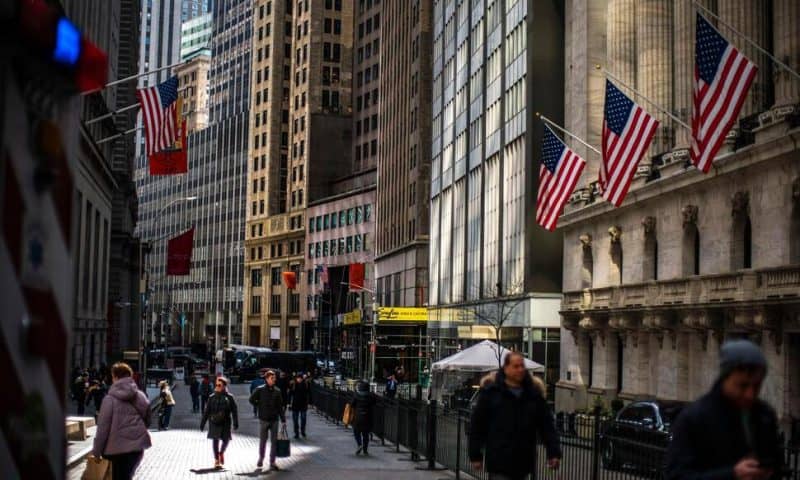Stocks drifted to a mixed close after last week’s roller-coaster ride left them shy of their records
NEW YORK — U.S. stock indexes held at a virtual standstill Monday as trading calmed after a whirlwind couple of days left them a bit shy of their records.
The S&P 500 edged down by 1.95 points, or less than 0.1%, to 5,202.39. It was coming off a shaky stretch where a 1.2% drop immediately flipped to a 1.1% gain.
The Dow Jones Industrial Average tiptoed 11.24 points lower, or less than 0.1%, to 38,892.80, while the Nasdaq composite inched 5.44 points higher, or less than 0.1%, to 16,253.96.
Much of the focus has been on interest rates and when the Federal Reserve will lower them to ease pressure on the economy and financial system. A string of reports showing inflation and the economy have remained hotter than expected has forced Wall Street to delay forecasts for when relief on rates could arrive.
This upcoming week has several flashpoints that could further swing expectations. On Wednesday will come the latest monthly update on the inflation that U.S. consumers are feeling. Later in the week will be reports on inflation at the wholesale level and expectations for upcoming inflation among U.S. households.
Fed Chair Jerome Powell said recently he still expects cuts to interest rates this year, but the central bank needs additional confirmation inflation is heading toward its target of 2%. The Fed has been holding its main interest rate at the highest level since 2001, hoping to grind down enough on the economy and prices for investments to get inflation under control. The risk of holding rates too high for too long is that it could cause a recession.
Some Fed officials have raised the possibility of rates staying high for longer, if inflation remains stubborn. That has pushed many traders on Wall Street to cut back expectations for how many cuts to rates may arrive this year to two from three. They had already drastically pulled back their forecasts from the start of this year, when many were expecting six cuts or more.
Traders now see roughly a coin flip’s chance of the Fed cutting interest rates at its meeting in June, down from a better than 70% probability a month ago, according to data from CME Group.
Cuts to interest rates not only make borrowing easier for U.S. households and companies, they also encourage investors to pay higher prices for stocks and other investments. Stock prices have already leaped in part on such expectations.
U.S. stocks have remained near records despite diminishing expectations for rate cuts this year because of the hope that the strong economy will drive profits for companies. Profits and interest rates are the two main levers that set stock prices.
Such hopes have helped the stock market’s gains broaden out beyond the handful of Big Tech stocks responsible for the majority of last year’s gain. Energy producers in the S&P 500 have jumped 16% this year, after dropping nearly 5% last year, on expectations that a recent rebound in energy prices will mean fatter profits in the future.
It’s also possible that the U.S. economy can post strong growth while simultaneously seeing inflation cool. That’s what Goldman Sachs economist David Mericle is forecasting, in part because of elevated immigration of younger people who are working in construction and other industries that generally earn lower wages.
Friday’s surprisingly strong jobs report showed that workers’ average hourly wages were behaving as expected, even though employers hired far more workers than expected last month.
But critics say stock prices already look expensive given their huge run of more than 20% from November into March. That means “achieving ambitious earnings forecasts has become paramount,” according to Lisa Shalett, chief investment officer at Morgan Stanley Wealth Management.
“Economic growth is good, but complacency around its implications is not,” she said.
To that end, this week will bring the start of the latest earnings reporting season. Delta Air Lines, JPMorgan Chase and other banks will headline the earliest days of the reporting period. Analysts are expecting companies across the S&P 500 to deliver a third straight quarter of growth.
Real-estate investment trusts helped lead the market after Apartment Income REIT said Blackstone agreed to buy it for about $10 billion in cash, including assumed debt. Apartment Income REIT, which also goes by AIR Communities, jumped 22.4%.
On the losing end of Wall Street was Trump Media & Technology Group. The company behind the Truth Social platform has seen its stock price swing sharply by the day, as experts say it’s moving more on the hopes of Trump fans than on the profit prospects of the company. It sank 8.4%.
In the bond market, Treasury yields rose to add to their gains for the year so far on diminished expectations for cuts to rates. The yield on the 10-year Treasury ticked up to 4.42% from 4.40% late Friday and from less than 3.90% at the start of the year.
In stock markets abroad, indexes mostly rose across Europe and Asia, though stocks fell 0.7% in Shanghai.

